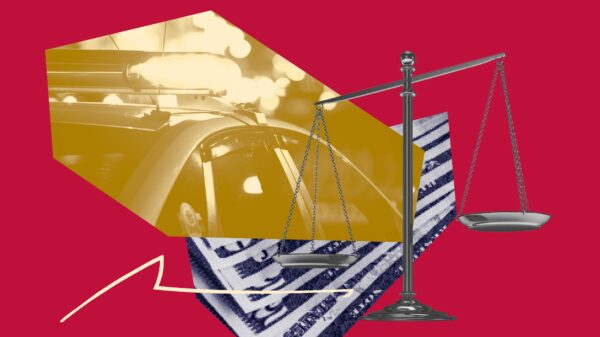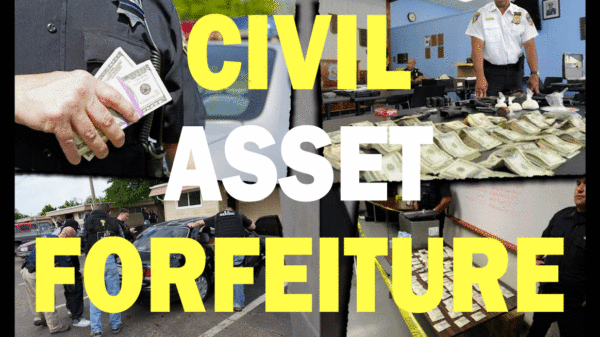What it is, where it happens, and reforms the state needs
By Ben Ruddell, Bryant Jackson-Green
Most people expect Illinois law enforcement to defend the private property of Illinois residents. As long as you obey the law, your life, liberty and property should be secure from the law – or so common sense would suggest.
Yet, every year, Illinois law enforcement agencies take tens of millions of dollars in cash, vehicles, land and other assets from state residents – in some cases without bringing criminal charges, let alone obtaining convictions, against property owners. Asset forfeiture laws, which allow the confiscation of private assets suspected of involvement in illegal activity, have been subject to abuse – and have produced large payouts for law enforcement. Since 2005, Illinois has pocketed more than $319 million from private citizens throughout the state.[1] Federal law enforcement took in more than $404 million in Illinois over the same time period.[2]
While forfeiture is lucrative for law enforcement, it can be devastating to the people from whom property is taken. Motor vehicles, because of their high value, have become particularly popular targets of seizures. But losing a vehicle even temporarily can precipitate a cascade of negative consequences in a person’s life, including the inability to maintain employment or even to attend court proceedings to try to reclaim the seized property. This practice can exacerbate impoverishment and harm the person’s innocent children and family members.
Exactly how much is gained by Illinois law enforcement through asset forfeiture, and which agencies are responsible for the bulk of asset seizures? And what can be done to ensure property owners face a fair, efficient and equitable process when their property is seized?
New research from the Illinois Policy Institute and the American Civil Liberties Union of Illinois answers these questions. Drawing on data from Freedom of Information Act requests to Illinois State Police and the U.S. Department of Justice, this report sheds light on how much specific law enforcement agencies are taking in Illinois under state and federal asset forfeiture laws. This report finds:
- Between 2005 and 2015, forfeiture proceedings have resulted in gains of more than $319 million for Illinois police departments, sheriffs, state’s attorneys and other law enforcement agencies.
- Most asset seizures take place in Cook County, followed by Lake, Will, Rock Island, Macon and Winnebago counties – but millions more dollars’ worth of property have been seized by jurisdictions throughout the state.
- The law enforcement agencies making the most seizures are the Chicago Police Department, the Illinois State Police, the Narcotics and Currency Interdiction Team, the Cook County Sheriff’s Office and the Decatur Police Department.
This report recommends policy reforms in three areas to better protect the rights of innocent property owners:
- Provide fair legal standards and procedures in forfeiture cases: Illinois forfeiture laws should require a criminal conviction before property can be forfeited to the government. The burden of proof in a forfeiture action should rest squarely upon the government and should be raised to require clear and convincing evidence. The practice of “nonjudicial” forfeiture, where property may be forfeited without a judge’s consideration of the merits of the case, should be eliminated. The law should require that civil forfeiture proceedings be instituted against the property owner rather than against the property itself, and all known owners of seized property should be named in the complaint and served with process. Finally, lawmakers should eliminate the requirement for the owner to post a cash bond for the right to challenge a forfeiture in court.
- Remove incentives to engage in “policing for profit”: Any property gained by the government through forfeiture should be auctioned and the proceeds deposited directly into the general revenue fund and appropriated by the General Assembly rather than being awarded directly to police and prosecutors’ offices. Illinois law enforcement agencies should be restricted from participating in federal equitable sharing programs so they cannot circumvent reforms to state forfeiture law and procedures.
- Increase transparency about how forfeiture funds are acquired and used: Law enforcement agencies and prosecutors’ offices should be required to publicly report information about how much property they seize, where and when the seizures took place, the outcome of all forfeiture cases, and how they spend any forfeiture proceeds.
Forfeiture is a powerful tool – far too powerful to allow governments to wield it with little public oversight or accountability. Lawmakers need to adopt meaningful asset forfeiture reforms to better protect the rights and property of Illinois residents.
[1] Information received from Illinois State Police pursuant to Freedom of Information Act 2016 request.
[2] Information received from U.S. Department of Justice pursuant to Freedom of Information Act 2016 request.
Related Issues
Related Content

- Criminal Legal Systems and Policing
Civil Asset Forfeiture

- Criminal Legal Systems and Policing
House hearing shines light on Illinois’ unfair, inconsistent laws on civil asset forfeiture
Stay Informed
Sign up to be the first to hear about how to take action.
By completing this form, I agree to receive occasional emails per the terms of the ACLU’s privacy statement.
By completing this form, I agree to receive occasional emails per the terms of the ACLU’s privacy statement.

